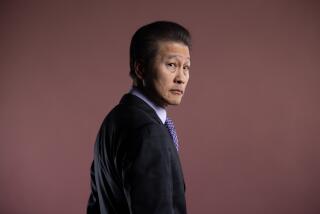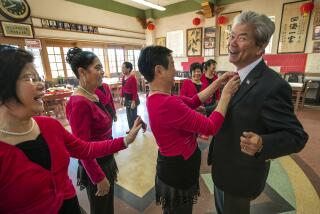Banker unites East and West
- Share via
The gig: Dominic Ng, 54, is chairman and chief executive of Pasadena’s East West Bank, formerly a savings and loan association based in L.A.’s Chinatown that he built into the nation’s largest Chinese American bank, with $23 billion in assets. The bank operates in California, New York, Boston, Seattle, Houston and Atlanta, with full-service branches in Hong Kong, Shanghai and Shantou, China. A specialty is helping Americans navigate a maze of regulations to invest in China — and increasingly vice versa, as Chinese investors buy U.S. businesses and homes.
From East to West: Ng was raised in Hong Kong by parents who had fled Communist China. A guitarist in a soft-rock group as a youth, he was lured to the University of Houston by a cheap tuition deal, and studied broadcasting before becoming an accounting major. A decade at Deloitte & Touche led to a stint as president of a Southern California investment firm, where he was hired to run East West by investors buying the bank. Twenty-two years later, Ng is a fixture in L.A. philanthropic circles and on corporate and educational boards. He lives near the Langham Hotel in Pasadena with his wife, Ellen, and their two teenagers.
The big deal: East West doubled its size by taking over a failing rival, San Francisco’s United Commercial Bank, during the financial crisis. “The No. 1 benefit was that UCB had a full banking license in China,” Ng said. “We only had representative offices there,” which could offer advice but not handle actual transactions. After the UCB merger, Ng said, “I can finance a deal right now, and we can talk to you about whether you want it booked in Hong Kong dollars or something else. ‘You want it booked in Shanghai renminbi or you want it in U.S. dollars and book it in the U.S.?’ Now we have these kind of options. It’s something that only a few banks, like JPMorgan, or the Citibank, can do.”
On the horizon: Consulting firm McKinsey & Co. has projected that in 10 years the middle-class population in China will increase from 230 million to 630 million, Ng said. “All the U.S. consumer brands are going to make quite a bit of money exporting services or goods to China. We don’t do business with Apple and Procter & Gamble, but we do business with a lot of their suppliers. And at the end of the day, when the suppliers are doing better, we benefit.”
Nontraditional mortgages: East West requires little documentation from borrowers but enormous down payments for its home loans, all of which it keeps on its books. Designed for Chinese immigrants with savings but no credit histories, Ng says such mortgages have proved attractive to non-Asians whose small businesses suffered losses during the economic downturn.
“They are making some money again and they want to buy a house, but somebody at Wells Fargo or BofA looks at three years’ tax returns and they say: ‘Your income doesn’t qualify.’ At East West, I say: ‘Do you have 40% down?’ He says: ‘Yeah, I can get 40% down because I have a lot of savings. I’m actually doing pretty good but they can’t underwrite me.’ And I say: ‘You know, I’m not worried about the income. If you put that much down, I dare you to walk.’”
Focus, focus, focus: Investors and board members have suggested expanding to other countries, but Ng says bridging the U.S.-China gap keeps him busy: “There are too many laws, too many regulations, too many compliance issues. There is no way I and my team can handle the risk when it gets so big and broad with so many different countries.... I know that if we just focus on these two places we can keep going. The second-biggest GDP in the world [China] and the biggest GDP. That’s all we can handle.”
Beyond the bank: When Ng spearheaded the 2001 fund drive for the United Way of Greater Los Angeles, he set two records, becoming the first Chinese American to serve as chairman and raising $66 million, the most ever for the annual effort. Recent activities include heading the Committee of 100, a group of Chinese American business leaders, and moderating a high-profile conference in L.A. last month: “U.S.-China 2022: Economic Relations in the Next Ten Years.” His many board positions include Mattel Inc., the Bowers Museum of Cultural Art and the Guitar Center Music Foundation.
Twitter: @ScottReckard
More to Read
Inside the business of entertainment
The Wide Shot brings you news, analysis and insights on everything from streaming wars to production — and what it all means for the future.
You may occasionally receive promotional content from the Los Angeles Times.









